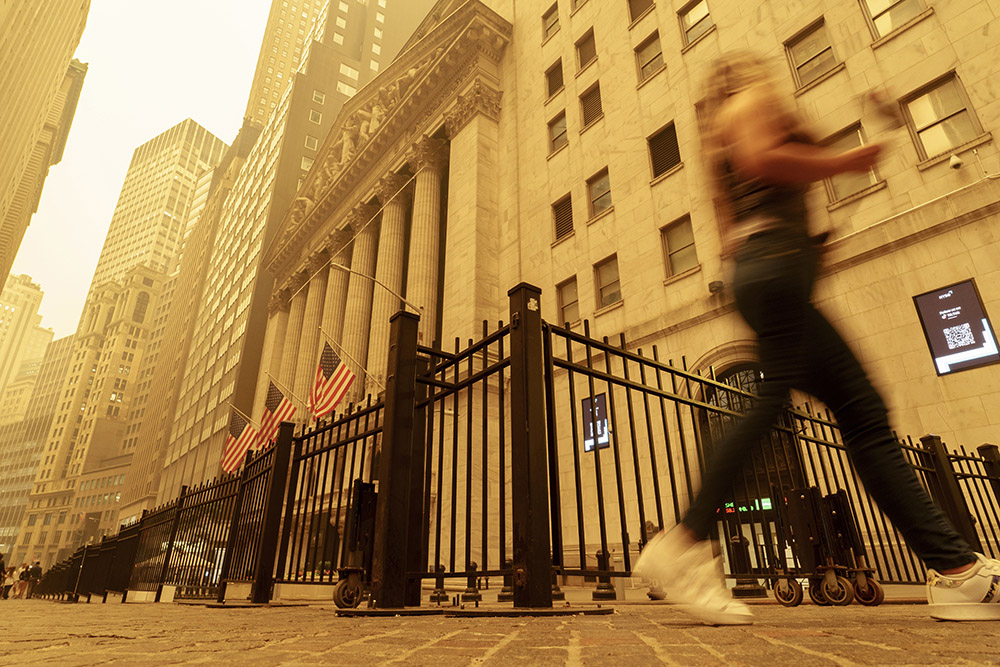
A pedestrian walks past the haze-shrouded New York Stock Exchange building in New York City June 7. Smoke from intense Canadian wildfires severely affected air quality in the Northeastern United States in early June. (AP/J. David Ake)
As heat waves blazed across the U.S. in July, what was later declared the hottest month on record, House Republicans held a series of hearings grilling investment practices based on environmental, social and governance criteria, or ESG.
The monthlong inquiries, aimed at what conservative lawmakers and their allies call "woke capitalism," produced an unexpected target of interest: Seventh Generation Interfaith Coalition for Responsible Investment, a contingent of 40 faith-based institutions, mostly Catholic congregations of women and men religious.
Letters from the House Judiciary Committee sought all communications and documents the world's largest proxy adviser firms — Institutional Shareholder Services and Glass Lewis — and others had with Seventh Generation Interfaith Coalition and fellow shareholder engagement organizations, alleging they may have colluded and violated U.S. antitrust law in advocating American companies to decarbonize their assets and achieve net-zero greenhouse gas emissions in their operations.
It was the second time in six months Seventh Generation Interfaith was named by conservative politicians investigating ESG-guided investing. A March letter from Republican attorneys general for 21 states lumped the faith investing coalition among "some of the most radical ESG activists" who use shareholder resolutions to press companies to align with the goals of the Paris Agreement on climate change and reach net-zero emissions globally by 2050 to wean economies worldwide off the use of fossil fuels.
"Indeed, pressuring companies to reach zero commitment is one of the most radical active investment strategies imaginable," the attorneys general wrote, calling shareholder proposals targeting banks an attempt "to cut off funding to business in our states that may be out of step with environmental activists' net zero goals."
The House hearings and attorneys general letter, as well as hundreds of bills proposed in red-state legislatures, are part of increasingly coordinated campaigns to push back against the growing tide of ESG investing and principles around socially responsible investing — approaches long championed by religious institutions.
Reports have traced funding for the anti-ESG blitz to the fossil fuel industry as well as right-wing and libertarian groups, including those tied to Catholic conservative activist Leonard Leo.
Advertisement
"It's a sign of the impact we've been having," said Cathy Rowan, director of socially responsible investments with Trinity Health, a Michigan-based Catholic health system operating in 22 states. "And it's obviously upset some people."
Still, the backlash has alarmed faith-based investors and their allies in socially responsible investing, who attribute it partly, but not entirely, to diminished support this year on a number of shareholder proposals, particularly around climate change. There's a fear that anti-ESG fervor in legislatures could blunt momentum for the rapid shifts in global finance needed to address climate change at a time when the window for avoiding the worst impacts is narrowing.
"The attacks have grown," said Timothy Smith, a senior policy adviser with the Interfaith Center on Corporate Responsibility who's engaged with companies for nearly five decades. "They've grown in intensity, and from my point of view, most of them are based on faulty premises."
Faith groups at vanguard of impact investing
While the term "ESG" is relatively new, the idea of introducing considerations beyond profits into investment practices dates back decades, with the faith community at the vanguard.
This September will mark the 50th anniversary of Seventh Generation Interfaith. In that time, it has been part of investor campaigns taking on the tobacco industry, raising concerns with baby formula, and opposing apartheid in South Africa. One of its co-founders, Capuchin Fr. Mike Crosby, helped introduce the first shareholder resolution on global warming at Exxon in 1997.
"Our religious congregations are seeking, indeed, a return on their investments to care for their elderly [and] to help continue their mission. But at the same time, they're committed to Gospel-based efforts that are to protect people and planet," said Christopher Cox, executive director of Seventh Generation Interfaith, which draws its name from the Great Law of the Iroquois that viewed decisions through the impact on the current generation and the seven that would follow.
A distinction between ESG and socially responsible investing that Cox and others involved in faith-based investing make is that while ESG seeks to assist companies in assessing and mitigating risks to improve returns, socially responsible investing adds an ethical lens to the equation.
"We look at [investments] in terms of the risks, as I think an ESG investor does, and also as a way to work for positive change," Rowan said.
One of the first uses of the term "ESG" came in a 2004 report from the United Nations Global Compact. It has gained steam in the past decade and entered mainstream investing practices, with some of the largest asset managers, like BlackRock, State Street and Vanguard, utilizing the principles in some fashion.
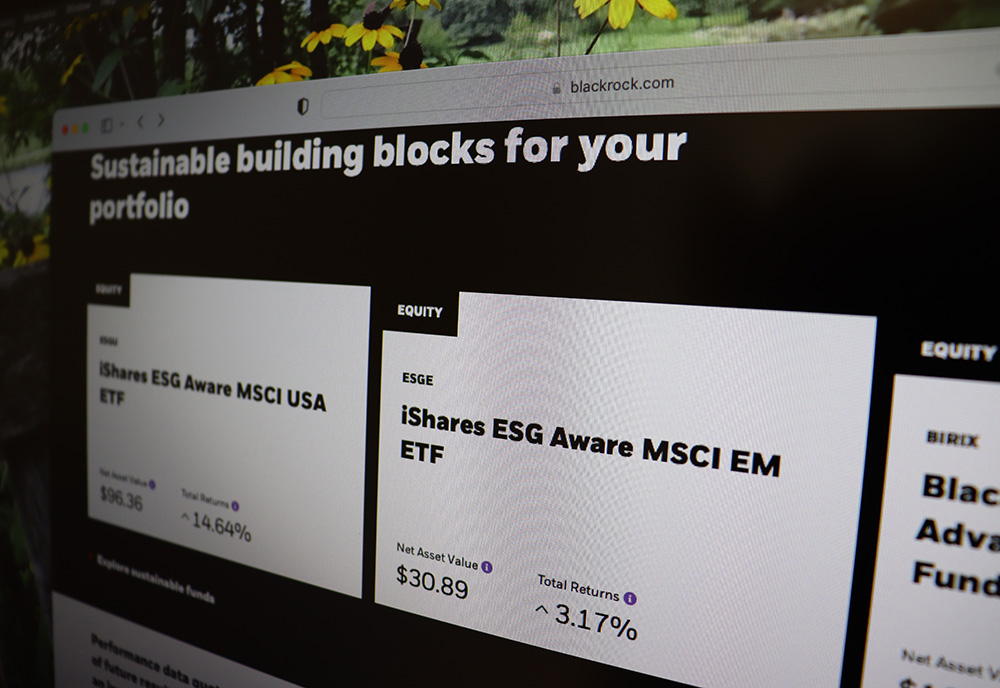
A page on the investment company BlackRock's website promotes ESG funds on Aug. 23. (EarthBeat photo/Teresa Malcolm)
Principles for Responsible Investing, a U.N.-supported network of global investors that advocates ESG strategies, totals $120 trillion in assets under management. In the U.S., sustainable investing peaked at $17.1 trillion at the start of 2020, but dropped to $8.4 trillion in 2022, according to a report from the U.S. Forum for Sustainable and Responsible Investment, which attributed the decline in part to more stringent disclosure proposals from the SEC around ESG funds and assets.
A 2021 report from Rockefeller Asset Management and New York University's Stern Center for Sustainable Business analyzed more than 1,000 studies between 2015 and 2020 on ESG and financial performance. It found in roughly 60% that ESG strategies performed better or the same as conventional investing, compared to 14% performing worse, with climate-specific strategies producing similar percentages.
"It's not fringe investing. It's not special interest investing. It's what you do as a prudent investor," Smith said.
In its 2021 revised socially responsible investment guidelines, the U.S. Conference of Catholic Bishops echoed Pope Francis in stating that economic progress cannot be defined only by increasing profits and production. The guidelines endorsed efforts to "actively promote and engage" companies through dialogue, proxy votes and shareholder resolutions to adopt corporate social and environmental responsibility guidelines.
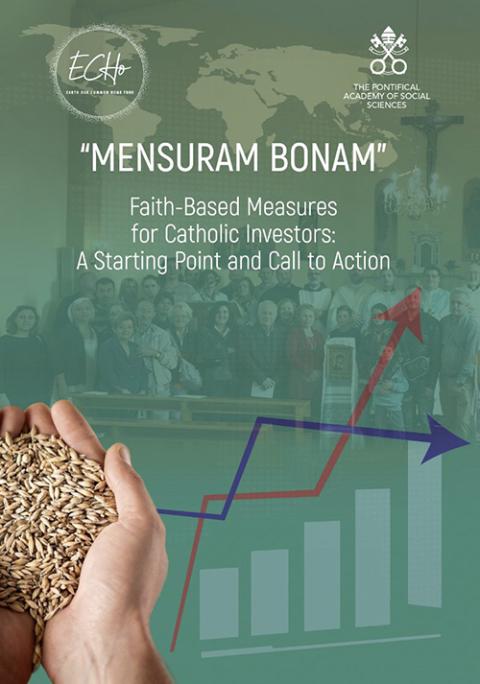
The cover of "Mensuram Bonam: Faith-based Measures for Catholic Investors: A Starting Point and Call to Action," published Nov. 25, 2022, by the Pontifical Academy of Social Sciences (CNS)
Another document, "Mensuram Bonam: Faith-based Measures for Catholic Investors: A Starting Point and Call to Action," issued in November 2022 by the Pontifical Academy of Social Sciences, references ESG directly nearly two dozen times.
"Many of the underlying factors for ESG resonate with the aims underlying [Catholic social teaching], creating a potential for new synergy between value and values," the document states, though it stresses the two are not synonyms.
"At their core the new and multiplying measures attending to environment, society and governance (ESG) reflect a fundamental truth: that the economy is nested within society, impacts human beings in positive and negative ways, and is bound by the natural limits," it states.
ESG draws Republican ire
With the elevated interest in ESG has come increasingly intense scrutiny that has pulled it into U.S. political culture wars.
Candidates for the Republican presidential nomination like Florida Gov. Ron DeSantis and businessman Vivek Ramaswamy have attacked ESG from the campaign trail, with DeSantis signing legislation in May "to protect Floridians from the woke ESG financial scam."
After their hearings, House Republicans advanced a package of bills to limit information that companies are required to disclose, raise thresholds for submitting shareholder resolutions, place limits on proxy voting, and allow companies to exclude ESG proposals. The bills are expected to pass the full House in the fall but not advance in the Senate.
In 2023 alone, Republican lawmakers in 37 states introduced 165 bills aimed at restricting ESG investments, with 22 becoming law, according to a report tracking the legislation.
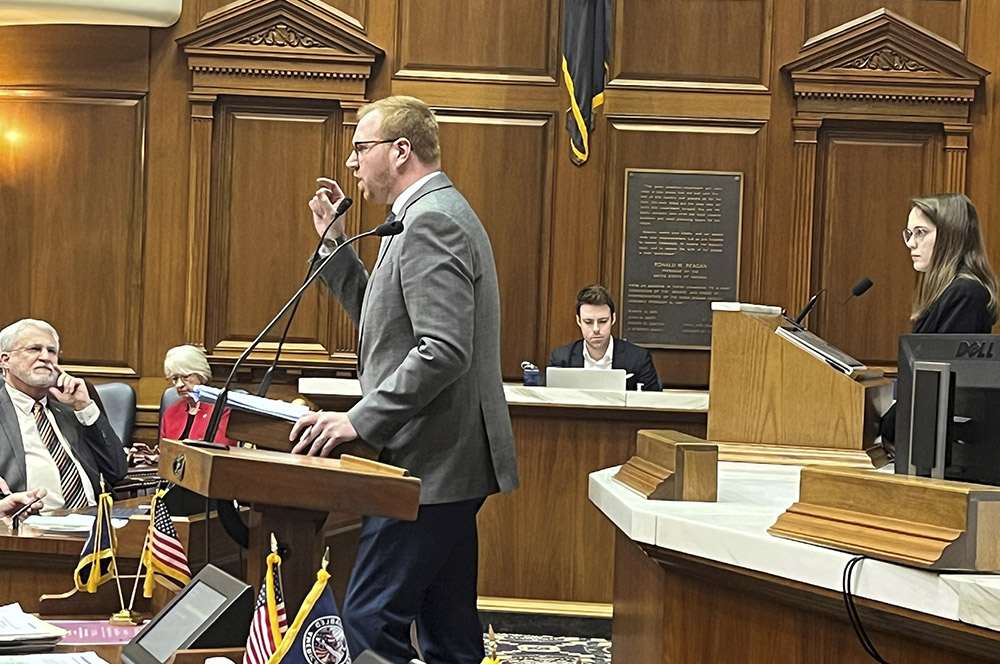
Indiana state Rep. Ethan Manning speaks about a bill he sponsored to ban state pension funds from socially and environmentally conscious investing during an Indiana House debate April 24 in Indianapolis. House members voted to approve the bill, sending it to Gov. Eric Holcomb, who signed it into law on May 4. (AP/Tom Davies)
The bills have sought to bar states and local governments from using ESG scores and contracting with financial institutions that limit engagement in certain industries, like fossil fuels. They have also targeted state pension funds by seeking to prevent them from supporting ESG resolutions or investing with asset managers that consider social and environmental risks.
In Texas, lawmakers have stated their efforts to oppose ESG investing were meant to protect oil and gas companies in the state.
Behind the laws have been numerous conservative and libertarian organizations and dark-money groups that have circulated model bills throughout statehouses. Many of them, like the Heritage Foundation, the Heartland Institute and the American Legislative Exchange Council, have long been active in efforts to deny and delay action on climate change.
Some of the main sources funding anti-ESG campaigns are organizations connected with Leo, co-chair of the Federalist Society who has been a central figure in placing conservative justices in the courts and outspoken against "woke capitalism." In January, The Washington Post reported ties between Leo and Consumers' Research, one of the right-wing groups heading the anti-ESG movement, while Bloomberg has reported Leo as the group's main financial backer.
'If you're not taking environmental or social issues into account when making financial decisions, you're ignoring part of your fiduciary responsibility.'
—Katie McCloskey
Katie McCloskey, vice president of social responsibility for Mercy Investment Services, the financial ministry of the Sisters of Mercy of the Americas, told EarthBeat that the laws and their backers paint ESG "as anti-financial decisions" and endorse a philosophy that the fiduciary responsibilities of asset managers, particularly at large financial companies and those overseeing state pensions, mean they should only prioritize profit without consideration of environmental or social factors.
"And we would argue the exact opposite, that if you're not taking environmental or social issues into account when making financial decisions, you're ignoring part of your fiduciary responsibility," she said.
Laws proposed so far could impact the work of faith-based investment groups, McCloskey added, for example, by limiting a pension fund or other larger shareholders from supporting resolutions on climate change, gender pay gaps or human rights.
"If other investors, like state plans, are unable to democratically vote with the resolutions that we bring because of state legislation that's been imposed, then that is detrimental to us in trying to change the companies that we own for the better," she said.
While this year's spring proxy season — when many companies hold their annual shareholder meetings — saw more ESG proposals (335), especially on climate change, their average shareholder support dipped to 21.6%, down from a peak of 33.3% in 2021, according to a recap report from leading shareholder advocacy groups, including As You Sow, a socially responsible investing network that includes many religious-based institutions.
Just eight resolutions garnered majority support, compared to 37 in 2022. Shareholder resolutions that draw 30% of the vote typically prompt a response from the company.
At the same time, 52 anti-ESG proposals, introduced by conservative groups like Consumers' Research and the National Center for Public Policy Research, drew little support, averaging about 2.4%, or less than half of the threshold to resubmit the following year.
On climate change, the 60 resolutions — three times the number from 2021 — drew an average of 22% support, down from 53.2% two years earlier.
During a July webinar breaking down the proxy season, analysts acknowledged that anti-ESG campaigns may have played a role in the declines. But they also attributed the drop to more resolutions seeking greater details — such as companies' short-, medium- and long-term emissions targets, and emissions data throughout the supply chain and product life spans — that some large investors and proxy advisers viewed as too prescriptive. Resolutions also were proposed at more companies and industry sectors beyond oil and gas companies.
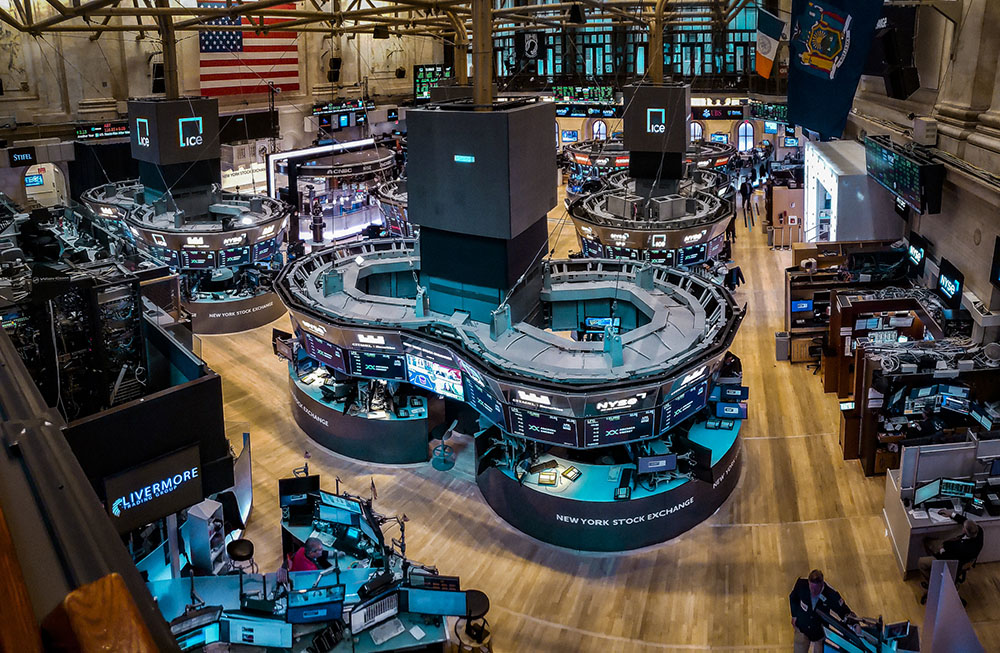
A view of the trading floor at the New York Stock Exchange in 2022 (Wikimedia Commons/Tobias Deml)
"I don't think it's determinative in terms of the changes of votes," Smith said of the anti-ESG efforts. "It's one factor of half a dozen."
Socially responsible investors hope to have a better sense of what influenced votes when mutual funds release their votes later in August.
Responses to ESG backlash
Through broader coalitions and in meetings with legislators, faith-based investors have spent more time this year defending socially responsible approaches.
Opponents of ESG "miss the fact that there are a lot of costs to the way our corporations run, our economic system's run," said Rowan of Trinity Health. "I mean, climate change is clearly the key illustration of that. What is the cost of continuing to emit greenhouse gases on people's health, for example? There are a lot of external causes that we don't take into account, and I think that the anti-ESG folks don't look at those."
'We have to take account of the risk associated with events emerging from the climate crisis. ... Those who wish to be willfully blind or ignorant of that, it's gonna cost them money.'
—Christopher Cox
Cox, with Seventh Generation Interfaith, said the ESG backlash has the potential to "freeze other people from doing the right thing," and refrain from bringing environmental and social concerns into their financial decision-making.
Just as worrisome, he said, is if they stall efforts to address climate change. Scientists have repeatedly said that significant progress is needed this decade in order to keep alive prospects of limiting average global temperature rise to 1.5 degrees Celsius (2.7 degrees Fahrenheit), and with it avoid more catastrophic impacts from strong storms, intense wildfires and flooding, and extensive heat waves and droughts.
"Insofar as this freezes real action on those issues, it has consequences of life or death for people," Cox said.
In the face of the anti-ESG movement, socially responsible investment advocates say it's important that companies and shareholders hear from them, too. The network As You Sow recently launched a new website, InvestingESG.org, to educate about ESG and lift up its proponents, including the CEOs of BlackRock, State Street, Bank of America and Coca-Cola.
Anti-ESG campaigns have been a challenge for companies, as well, Rowan said. In some cases, it has led to "green-hushing," where companies downplay or keep silent about environmental and social targets while still working to meet them.
In meetings with companies, members of the Interfaith Center on Corporate Responsibility have encouraged executives to continue moving forward in incorporating positive social and environmental impacts into their businesses, while in some cases also calling out lobbying that funds and supports opposition to addressing climate change or diversity issues.
While supportive of ESG strategies, religious shareholder advocates agree there are ways to improve them.
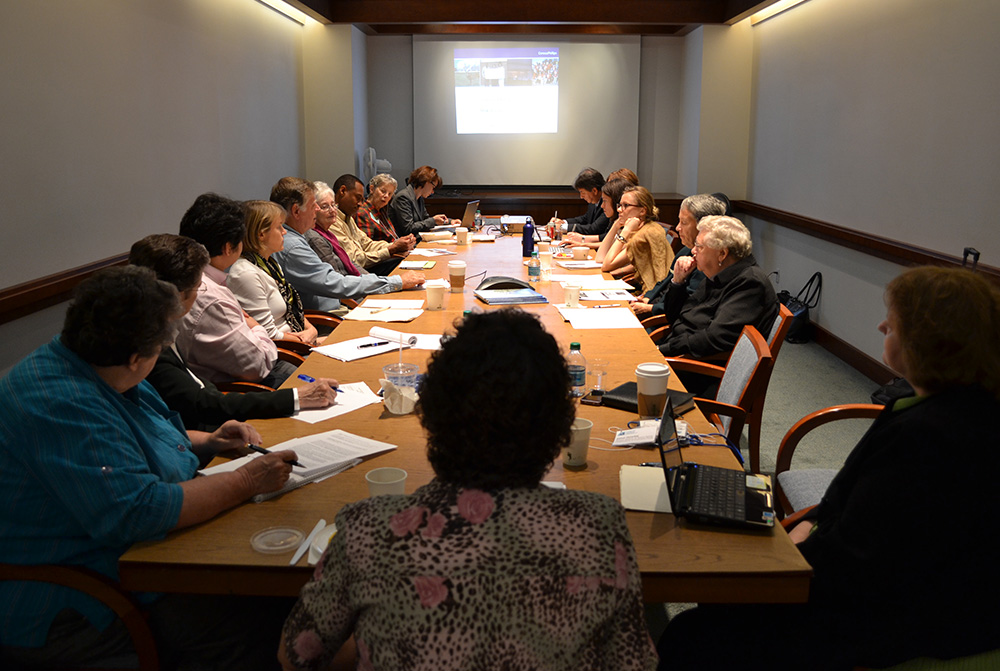
Corporate dialogues are one of the main vehicles that Interfaith Center on Corporate Responsibility members use to raise issues with corporate management. This 2016 meeting between ConocoPhillips and members of the center focused on numerous climate and environmental justice topics. (Courtesy of Interfaith Center on Corporate Responsibility)
One would be a better definition of ESG and all it entails. Another challenge is the wide net of metrics that have emerged to rate companies on various social, environmental and governance scales, which place additional reporting burdens on companies to provide data to numerous tracking organizations.
"There are certainly ways within which ESG metrics and things like that can be improved," Cox said. "But all the evidence around us, even from the business practices of insurance companies in places like Florida and California, tells us we have to take account of the risk associated with events emerging from the climate crisis. And that those who wish to be willfully blind or ignorant of that, it's gonna cost them money."
In the face of attacks on ESG investing, faith-based shareholder advocates say they remain as committed to their mission as ever.
"We're raising important issues that we think the board and management of companies need to be paying attention to," Rowan said. "That's what we've been doing for decades and we'll continue to do so."







